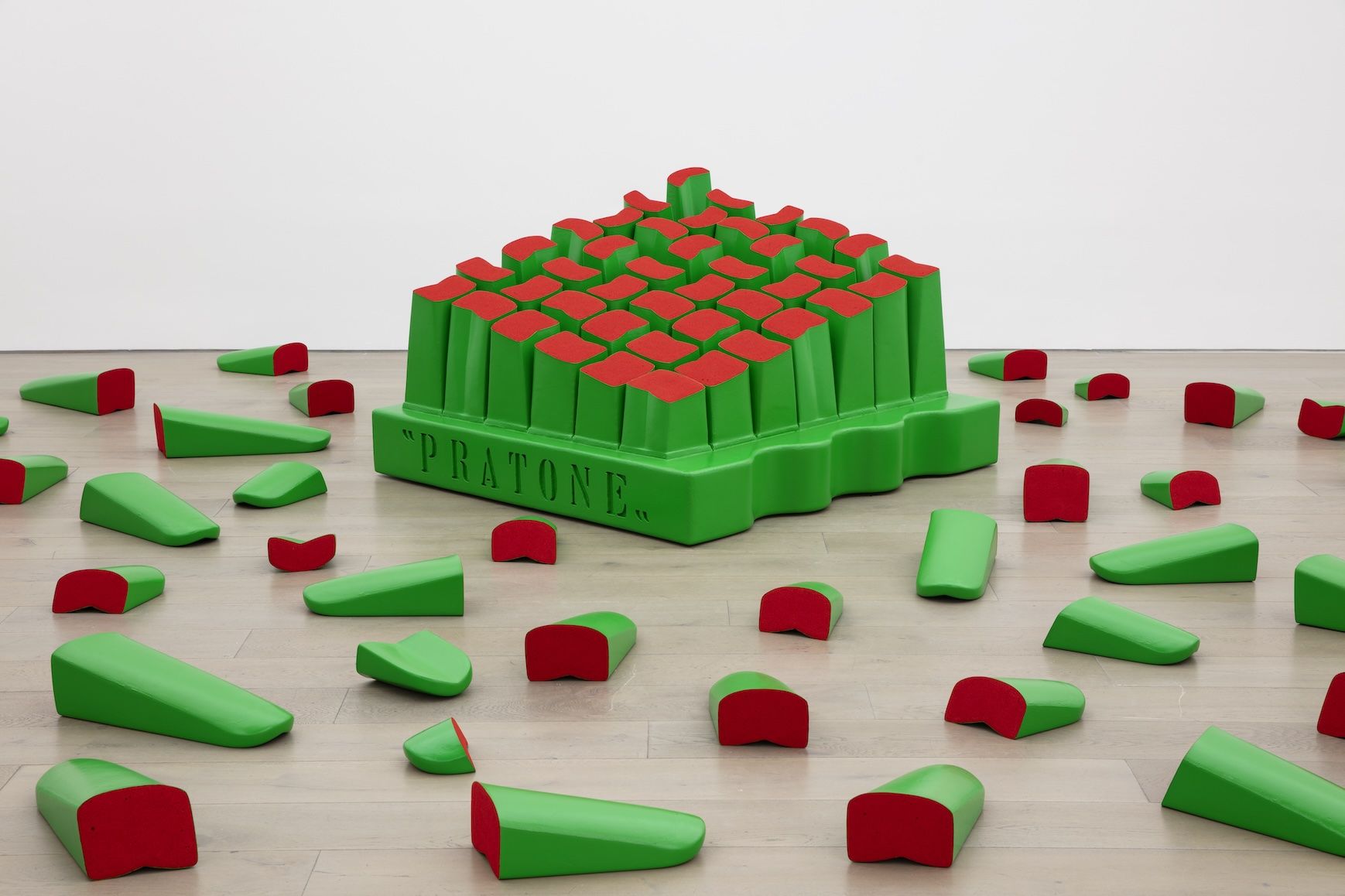Gufram unveil its collaboration with art collective MSCHF presenting the new Cut Pratone® and 5G Cactus® pieces at Perrotin Gallery in New York
September 3, 2024

New York, 5 September 2024 - Gufram, the Italian Radical Design brand internationally acclaimed for its unique way of mixing art and design, partners up with American conceptual art collective MSCHF on the occasion of the exhibition Industry Plants at Perrotin New York. The exhibition highlights are two large-scale pieces that mark MSCHF's debut in furniture design through a new collaboration with Gufram: Cut Pratone® and 5G Cactus®.
The first artwork takes inspiration from Gufram's iconic Pratone®. Initially conceived by Giorgio Ceretti, Pietro Derossi, and Riccardo Rosso in 1971, this piece challenged the conventions of seating design while playfully questioning humankind's relationship with the natural world in an era of hyperconsumption. Over fifty years later, in Cut Pratone®, MSCHF prompts a reconsideration of both the original question and the design that posed it by slicing through the thicket, scattering clippings and revealing the Pratone®’s bloodied foam innards. This piece is available in a limited edition of nine.
The intervention by MSCHF carries on the spirit of the original design’s critical provocation by inviting viewers to interrogate the strategies, aims, and efficacy of the radical attempt to reshape society through design. The dissection of Pratone® perfectly expresses the persistent, pulsing vitality of the original design’s revolutionary aspirations and its immediate relevance to the conditions of our ecological and cultural present.
Whereas MSCHF’s hack of the Pratone® represents the first and only creative design intervention to that work since its introduction in 1971, 5G Cactus® is the latest in a series of creative collaborations between Gufram and contemporary artists and designers centering on the whimsical Cactus® coat rack, first designed by Guido Drocco and Franco Mello in 1972.
In this unique piece of art, the almost irresistibly sensuous surface of the original design is untouched, save for the addition of a clunky 5G antenna. Perched atop the Cactus®’s glossy green arms, the ominous armature calls to mind today’s widespread practice of camouflaging cellular network towers as local flora. The feebleness of these attempts to naturalise (and neutralise) technology’s omnipresence are often laughable, but they take on increasingly high stakes as bogus conspiracy theories surrounding the nefarious impacts of 5G technology on human life proliferate.
By situating the source of these contemporary technological anxieties—which are themselves largely circulated through social media platforms reliant upon the global connectivity apparatus—onto an artificial representation of the natural world destined for the domestic interior, MSCHF adds a fresh layer of discourse to the prickly relationships between culture and nature, interior and exterior, desire and ambivalence that Cactus® first poked at over half a century ago.
Meanwhile, MSCHF takes the imposing size of the Cactus® and reduces it for an edition of tabletop versions of the work, domesticating these tensions even as they stoke them. The Guframino 5G Cactus® is the miniature version of the artwork, faithfully retaining the design and details of the original version at a 1:8 scale. Viewed as a whole, the disorienting shifts in scale throughout the exhibition destabilise the relation of the human body to the material things that populate both our lived environment and our digital dreamscapes, provoking reflection on the abstractions and absurdities inherent in the assignment of both sociocultural and monetary value.
NOTES TO THE EDITORS
MSCHF
INDUSTRY PLANTS
September 6 – October 19, 2024
Perrotin New York
130 Orchard St, New York
ABOUT MSCHF
MSCHF is an art collective that engages art, fashion, tech, and capitalism. The collective subverts mass/popular culture and corporate operations as tools for critique and intervention. MSCHF, as a practice and as an entity, manifests the ambition for creative work / a creative entity to wield real tangible power (in culture; On the world stage; As measured against the cultural power held by world-straddling companies, celebrities, and media entities).
www.mschf.com
ABOUT PERROTIN
Emmanuel Perrotin founded his first gallery in 1990 at the age of twenty-one. Since then, he has worked closely with his roster of artists, some for more than twenty-five years, to realize their ambitious projects. Perrotin has ten galleries globally, including a New York space, totaling approximately 86,450 square feet (8,000 square meters) across all locations. These multiple venues offer great flexibility, enabling Perrotin to continue staging ambitious projects and large-scale exhibitions for the varied group of world renowned artists it represents. The gallery organizes about 45 exhibitions a year, and partakes in about 21 international art fairs. Perrotin represents more than 68 artists and estates, and also collaborates with about 31 others. Altogether, the gallery provides exposure to both established and emerging artists of more than 27 nationalities. The gallery also publishes books, special editions, and artists’ objects, available in every Perrotin bookstore.
www.perrotin.com